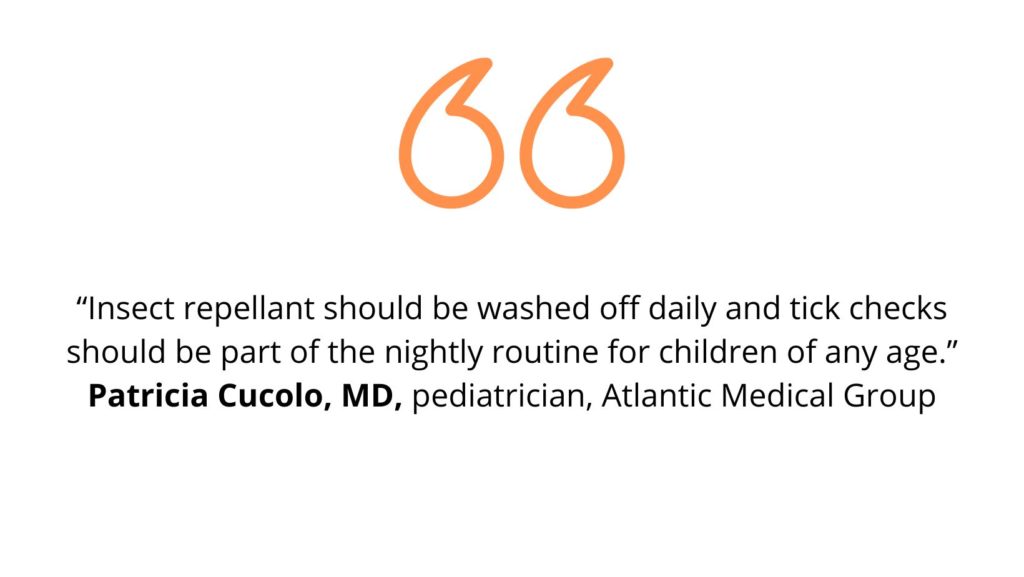What Every Parent Needs to Know this Summer
Summer camps create memories that last a lifetime. The benefits of attending summer camp are numerous: kids are given the opportunity to make friends, learn new skills and build self-esteem. Great camps teach teamwork, resiliency, and a connection with the natural environment.
Day camps are perfect for kids who want to stay close to home, sleepaway camps offer kids the freedom to explore their independence, and specialty camps enable kids to delve into their passions.
No matter what kind of camp you choose, it’s important to do your homework to keep your kids safe and healthy this summer. Patricia Cucolo, MD, a pediatrician with Atlantic Medical Group, offers tips so the summer stays focused on fun.
The best camp environment is one where trusted, caring, well-trained adults set safe boundaries and allow kids to explore and grow.
Prepare for New Experiences
Talk to your child about what will happen at camp and prepare for new experiences ahead of time – whether they will be physical or emotional, Dr. Cucolo said.
- Go over the camp schedule together to relieve nerves and help your child feel comfortable.
- Review the rules and guidelines of the camp together. This may help ensure they’re followed.
- Younger children may need to practice certain skills – like taking off a wet swimsuit or buckling a school bus seatbelt.
- If your child will be sleeping away from home for the first time, plan a sleepover at a trusted friend or relative’s house prior to camp. Compare the length of time away with a positive experience, like a vacation.
- If your child is headed to an intense sports camp or spending a week in the wilderness, make sure they’re physically fit and prepared for the activity level.
Keep Your Camp Informed
Every child should have a recent physical exam by a medical professional and to be up to date on all immunizations before camp, Dr. Cucolo said. A consent for treatment form should also be provided to the camp in case your child is injured. Before camp starts, parents should make sure the staff has a detailed health history of their child, including any significant illnesses, allergies, or medical conditions.
If your child requires medication or special care for a condition, make sure qualified staff will be present at camp and on field trips. Medications should be provided before the start of camp and labeled with the child’s name and correct dosage.
“Know who will be in charge of administering care and make sure the camp is educating their staff. Medication should be easy to access and stored safely.”
If your child has severe allergies or asthma, submit an action plan (with a picture of your child attached) to the camp and ensure the staff is trained to use any device your child needs, like an EpiPen or inhaler. Educate your child about their condition and what to do in an emergency as well.
Swim Safely
 Swimming is one of the most common activities at summer camp, and for many children, cooling off in a pool, lake or pond is a highlight of the summer. However, bodies of water can be potentially dangerous places.
Swimming is one of the most common activities at summer camp, and for many children, cooling off in a pool, lake or pond is a highlight of the summer. However, bodies of water can be potentially dangerous places.
“A life vest is needed for all kids of all swimming abilities in natural bodies of water – like an ocean, pond or lake – because of obstacles under the water, hidden currents and other dangers,” Dr. Cucolo said. She added that inexperienced swimmers should also wear a life vest or life jacket in the pool.
Teach your children to make sure they’re always supervised when going into the water and not to jump in after a toy or other object without permission, Dr. Cucolo said. If possible, help your child learn to swim before camp begins. All water activities should also be supervised by a CPR-certified lifeguard.
Gear Up for Activities
Summer camp is a perfect place to be active – to get lots of physical exercise and run, jump, and hike. To avoid injury, be sure your child is equipped with the shoes, clothes and supplies appropriate for the camp they will be attending. 
“There’s no universal list of gear for every camp; rather there’s the right gear for the type of camp they’re going to. A child headed off to wilderness camp will need different equipment than one swimming and playing locally,” Dr. Cucolo said.
If your child will be riding anything with wheels or playing sports, ask the camp staff about policies for helmet use. Whether they are riding a bike, horseback riding, playing football or trying rock climbing, children should always wear a properly fitting helmet that is designed for each activity.
The keys to injury prevention are the right equipment and supervision, Dr. Cucolo said.
Atlantic Health System is always here for you with emergency and urgent care services if needed.
Remember to Hydrate
 All the physical activity kids will experience at camp comes at the height of the summer, when the weather is often hot and humid. “Kids having fun outside will sweat more due to the heat and physical activity – so hydration is critical to keep them safe and healthy,” Dr. Cucolo said.
All the physical activity kids will experience at camp comes at the height of the summer, when the weather is often hot and humid. “Kids having fun outside will sweat more due to the heat and physical activity – so hydration is critical to keep them safe and healthy,” Dr. Cucolo said.
Campers need to drink lots of water to replenish what they lose as their activity increases. If a child doesn’t drink enough water, heat exhaustion, heatstroke and dehydration can occur.
Send your child to camp with a reusable water bottle and remind them about the importance of drinking water throughout the day. Make sure that the camp has lots of water breaks throughout the day as well.
Parents can also help at home. Hydrating the day before children go to camp is just as important as it is at camp, Dr. Cucolo said.
Block the Sun
At camp, outdoor fun in the sun means exposure to UV rays that can cause skin damage and sunburn. Campers should have layers of sun protection, starting with sunscreen that is correctly applied and reapplied every two hours throughout the day and after swimming.
The American Academy of Dermatology recommends that all kids, regardless of their skin tone, wear water-resistant sunscreen with an SPF of 30 or higher. Kids should use generous amounts of sunscreen on every exposed part of their body, including their arms, legs, face, ears, hands, feet, shoulders, and behind the neck. Many camps ask children to apply their own sunscreen, so practice with your child ahead of time.
Clothing offers another layer of protection from the sun. Look for lightweight, tightly weaved clothes or items labeled sun protective. Also encourage children to find shade when possible.
Dr. Cucolo also emphasized the important role sunscreen plays in preventing cancer.
Eric Whitman, MD, surgical oncologist, medical director of Atlantic Health System Cancer Care and the director of the Atlantic Melanoma Center, said “it’s really important to be careful, particularly when you’re younger, because we think that as people are growing and maturing, their skin is maturing as well, and they seem to be particularly susceptible to the damage from sun exposure when they’re in their teenage years or 20s.”
Prevent Bug Bites
Kids will share the great outdoors with creatures big and small, so it’s important to protect them from bug bites. Aside from the itchy nuisance, insect bites can lead to allergic reactions, wounds can become infected, or an insect may transmit disease.
Mosquitos and ticks can both carry disease, but ticks are a bigger cause for concern in the New Jersey area. Ticks can carry Lyme disease and other pathogens. Dr. Cucolo said, “in our area, prevention of Lyme disease is very important.”
Lightweight clothing that covers exposed skin offers some protection from mosquitos and ticks. Insect repellant should also be applied to exposed skin, clothing or both, she said. Insect repellant should not be applied under clothes or to areas with sunburn or broken skin.
Dr. Cucolo said an insect repellant with a DEET concentration of 10 to 30 percent should be applied to children attending camp. A lower concentration works for a shorter length of time (i.e., 10 percent DEET provides protection for one to two hours and 30 percent DEET protects up to five hours.) Using more does not make the repellant more effective, she said. Tick checks are also very important.
For children who will be outdoors for prolonged periods of time or in areas with a high insect infestation, a bug repellant with a higher concentration of DEET is recommended. Parents may also want to consider clothing coated in permethrin.
Stay Safe from COVID-19
Although summer camp provides a respite from everyday life, the impacts of COVID-19 are still with us, and camps should have mitigation strategies in place in the event of an outbreak. Children age 5 and older should be immunized against COVID-19. The vaccine helps prevent severe illness and is important to protect your child and others in the community, Dr. Cucolo said.
Find out what vaccination policy and safety protocols the camp is following, including testing and mask requirements, and what measures are in place if a child or counselor tests positive for COVID-19. Most camps should be working with the local health department, much like the schools.
Parents should also speak with their children about prevention measures – like handwashing and wearing a mask in crowded spaces – at camp and adjust based on the COVID-19 rates in their local area.
When your child looks back on their summer camp experience, they will likely remember the camaraderie, songs, laughter, and the friends they made. Parents want to ensure they are safe, healthy, and happy at camp. Following these guidelines will help make those life-long memories possible.
This article was done in partnership with Atlantic Health System




